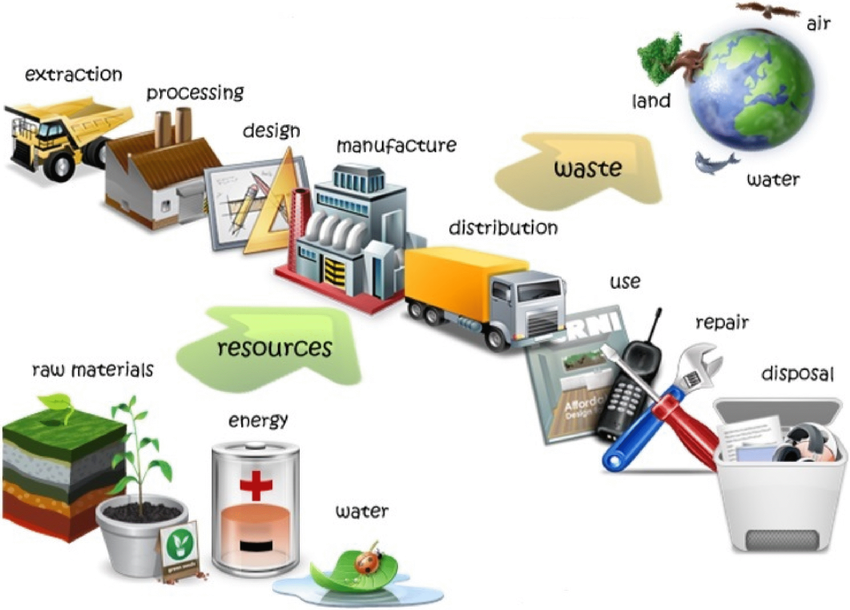Life Cycle Assessment (LCA)


Life Cycle Assessment (LCA)
Life Cycle Environmental Impact Assessment should be the most comprehensive and scientifically robust method of assessing the environmental impacts of any material, product, building neighbourhood, region, nation, policy, regulation or initiative.
LCA Comprises:
- Goal and Scope definition compared to competing alternatives both physically/geographically and over time (disposal and recycling).
- Process diagram and boundary (flows of materials, energy, water, pollutants and co-products).
- Inventory of quantities of materials, energy and resources consumed, wastes and pollutants emitted to air, water or ground and all of the coproducts that cross the boundary.
- Allocation between co-products – economic allocation used consistently throughout.
- Transformation to flows to/from nature using established unit process databases.
- Classification – which flows contribute to which environmental impacts.
- Characterisation of each flow for potency of impact.
- Weighting of each impact category for relative importance using citizen panel method pioneered and used internationally (including for the UK BREEAM environmental rating system).
- Resulting ecopoint permits fair comparison of any competing alternatives.
The most potent attribute of LCA is its comprehensiveness and ability to compare the full consequences of the decisions that we make or materials or products that we consume, but this requires the LCA community to agree a single universally adopted methodology for the conduct of LCA.
Nigel is simultaneously the biggest proponent of LCA and it’s biggest critic for failing to agree such a methodology and apply it universally. Currently, by judicious choice of goal, scope, measurement boundary and methodology every vested interest can use their version of LCA to prove that their vested interest is best! https://www.sciencedirect.com/science/article/pii/S1877705817317307
Although good progress was made in the 1990’s, the LCA community have now failed for decades to stand up to vested interests and standardise methodology for LCA. Worst still, even some fundamental scientific principles have been compromised no longer representing physical reality or preserving mass/elemental/thermodynamic balances (what goes in comes out).
Nigel has both led and contributed to UK, US and Australian initiatives to develop consistent methodology. In 2010, Nigel established the “LCA Round Table” https://www.linkedin.com/groups/7039204/ to highlight the problems and propose and debate solutions. He has drafted the “Grail” methodology, free for anyone to use or adapt.
Clarity Environment LCA follows the Grail methodology without fear or favour. A poor result reveals opportunities for real improvement, a good result is a deserving result. Clarity will not greenwash your product as best one week and then greenwash your competitor’s product as best the next – the results fall as they fall. In the long-run, the environment itself will punish greenwash.
Services
Environmental Policy
Extensive experience in technical, advocacy, business, and policy in UK, US and Australia, a global leader in Climate, Energy, and Life Cycle Assessment.
Life Cycle Assessment
Life Cycle Environmental Impact Assessment potentially the most comprehensive method for assessing environmental impacts.
Life Cycle Based Building Design
Discover the complex interactions and perverse outcomes arising from design decisions affecting climate, environmental impacts, capital and Life Cycle Costs.
Process and product evaluation
Clarity Environment can assist manufacturers to understand and reduce the true climate and environmental impacts of their processes and supply chains.
Ecolabelling/Environmental Product Declaration
Clarity Environment helped develop National Standards for Ecolabels and EPDs, ensuring technical robustness and efficiency.
Transport Impacts
Understand the transport impacts of buildings and location and the strategic benefits of electric vehicles with bi-directional charging, transforming Australia’s grid and enabling 100% renewable power.
Climate Deaths
Climate impacts are killing people. Discover the climate mortality liabilities of your government or corporate policies, investments or lifestyle choices.
